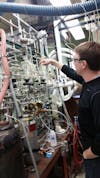Use the fields below to perform an advanced search of The Daily Cardinal's archives. This will return articles, images, and multimedia relevant to your query. You can also try a Basic search
823 items found for your search. If no results were found please broaden your search.
(12/07/15 5:30am)
With a variety of courses and flexible curriculum, the Nelson Institute for Environmental Studies offers students the broad education they need to collectively solve environmental problems.
(12/07/15 5:15am)
Dear Ms. Scientist,
(12/03/15 5:25pm)
After seeing the most recent film about the life and career of Steve Jobs, Bill Gates, software pioneer and co-founder of Microsoft, is absolutely ecstatic about the biographical films he expects to come out about him after he dies.
(12/02/15 5:45am)
The oceans of the Archean were nothing like today’s vast blue pools. In fact, these oceans lacked free oxygen. Until recently, it was thought the oceans’ water columns were uniformly anoxic until the Great Oxidation Event, which occurred 2.4-2.2 billion years ago. However, researchers at UW-Madison have discovered evidence of free oxygen in Earth’s shallow oceans much earlier.
(12/02/15 5:30am)

Esselman’s research reveals molecules’ chemical structures.
(12/02/15 5:30am)
Chemistry is everywhere. It makes up everything. The universe is buzzing with an imperceptible world of lively, vivacious molecules. It is the driving force the keeps everything together. Chemists are approaching new frontiers in a world that is mind-bendingly smaller than imaginable.
(12/02/15 7:15am)
Dear Ms. Scientist,
(11/16/15 11:24pm)
The American Physical Society named a UW-Madison electron storage ring a historic site Friday, recognizing it as an imperative tool for many scientific studies over its 20 years of operation.
(11/16/15 7:03am)

UW-Madison doctoral student Luke Loken collects real-time data on Lake Mendota to study the spatial patterns of the water chemistry.
(11/14/15 9:50pm)
Dr. William Fahl has a long history at the University of Wisconsin-Madison. He completed his B.S in zoology and chemistry in 1972 and went on to complete his Ph.D in physiology and oncology here in 1975. He is now a Professor of Oncology at the University of Wisconsin-Madison and runs a research lab in the McArdle Laboratory for Cancer Research. His lab's main interests involve finding a way to enable cells to protect their genomes against natural, environmental, or chemotherapy induced toxins. In this podcast, Dr. Fahl discusses the modern day approach to combating cancer as well as his lab's recent discoveries. One of these, which is a focus of this podcast, is the development of a protective drug molecule to prevent hair follicles from deteriorating during chemotherapy. This molecule is applied via a topical lotion which is absorbed into the scalp which then acts as a vasoconstrictor on hair cells and prevents them from receiving the toxic chemotherapy drugs which cause hair loss. This discovery is currently in clinical trials. If successful, this revolutionary discovery by Dr. Fahl and his lab has the potential to completely eliminate the adverse side effect of hair loss due to chemotherapy.
(11/11/15 5:30am)
There are many committees held for the regulation of synthetic biology, the design and construction of new biological parts, devices and systems, including the redesigning of our existing biological systems such as designer genes. Many argue that designer genes could be used to cure diseases, such as Huntington’s disease, autism and cancer. Others argue that scientists are playing god when they can design genes. Most are unsure of the impact that it will have on society.
(11/11/15 5:30am)
Every year, the Wisconsin Institutes for Discovery hosts the Wisconsin Science Festival, a two-day event where many local organizations set up activities for Madison-area children. Throughout the day, they also schedule a variety of talks centered on topics in science.
(11/11/15 5:15am)
Dear Ms. Scientist,
(11/10/15 12:44am)
A new study published in The Journal of Neuroscience used rodents to find how stress chemicals alter the brain, and could change how post-traumatic stress disorder is treated.
(11/09/15 12:34am)
Soren Wheeler, the senior editor at Radiolab, will be on campus all week to work as UW-Madison’s Science Writer in Residence in an effort to help students improve their science writing in a new age of journalism.
(11/03/15 2:52am)
In light of Exact Sciences’ recent financial struggles, the company’s CEO Kevin Conroy announced Monday he will no longer run the biotechnology company in downtown Madison.
(10/28/15 4:45am)
In an age where many things are micromanaged and controlled for the most efficient results, aquatic ecologist Stephen Carpenter says that this kind of management may end up being detrimental in the long run.
(10/28/15 4:30am)

Walking along the Lakeshore Path, Glaeser, Nakasone and Ortiz-Santana teach the group about fungi and mushrooms.
(10/28/15 4:30am)

Walking along the Lakeshore Path, Glaeser, Nakasone and Ortiz-Santana teach the group about fungi and mushrooms.
(10/28/15 5:30am)
The light shines through the branches and casts illuminated streaks on the surface of the Lakeshore Path. The nature preserve is quiet and still as the wildlife prepares for the winter transition. Beautiful trees thrive, reaching to the sky.





